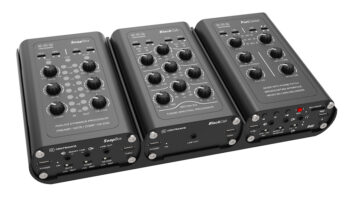
Music has become more homogenous since 1955—just ask the Artificial Intelligence Research Institute of the Spanish National Research Council in Barcelona. The organization analyzed half a million songs and came to the conclusion that timbral variety has gone down, pitch content (the variations in chord structures and melodies) has decreased, and as we all know, dynamics have narrowed to where nothing can stand out—because everything stands out. The study also alludes to less instrumental diversity, and more standardized recording techniques, as contributing factors.
Sure, you can quantify musically related parameters on a technical basis—but can you correlate that to whether music is “good” or “bad”? Well, I think the Ramones and J. S. Bach are “good,” so what do I know? For as long as I can remember, I’ve heard that “today’s music isn’t as good as it used to be.”
But…
People often cite the ’60s as a particularly adventurous time in pop music. That’s a little skewed because the good stuff has stood the test of time while the dross has fallen by the wayside. Nonetheless, people were integrating synthesizers, sitars, harpsichords, and wildly experimental recording techniques (like reversed tape, running guitars through rotating speakers, crazy panning, and the like) into the mix. A pop musician might just as easily cite Stockhausen or Robert Johnson (or both!) as an influence. Concerts could have a folksinger open for a hard rock band, with Miles Davis as the headliner. Even that much-maligned era of ’70s music brought us everything from Kraftwerk to disco to soft rock to metal, and the ’80s witnessed an explosion of new textures from electronics.
But…
Let’s ignore the question of good or bad; it can be debated endlessly. Instead, let’s ask if music is getting more … well, inbred. If indeed it is, maybe I know why.
It seems most of what’s being offered as instructional material on YouTube (and other places) address questions that start with “How do I?” How do I get that big drum sound like John Bonham? How do I set my compressor to make vocals pop? How do I choose the right mic for recording a guitar amp? How do I master to make my music loud? How do I treat my room acoustically?
Or the question might be, “How do I write a song?” There’s an ad on YouTube for a guy who says he wrote the song you’re hearing in two minutes, with his canned MIDI sequences. I believe him. It indeed has the “look and feel” of music. It would be perfect as a soundtrack for a video presentation that urges you to buy a timeshare. But if you appropriate those sequences, are you creating a unique, personal statement based on your artistic vision? I’m not sure the correct answer for “how do I write a song?” is “appropriate parts of someone else’s.”
Open Channel: Authenticity and the Art of Performance
Of course, there’s nothing inherently wrong with asking how to do something, because that’s how you obtain a specific, desired result—but it’s also a trap: Asking “how do I…” can only elicit an answer based on something that’s been done before. You’re asking how to do something that already exists. If you ask, “How do I get that cool synthesizer bass sound?” and the answer is a Minimoog, then you’re going to use the same Minimoog sound that has been on a zillion recordings. Yes, it is a cool sound—but nothing evolves from that choice.
Granted, there’s something to be said for respecting stylistic norms. You’re not going to hear a lot of death metal played on ukuleles and nylon-string guitars.
But…
If you ask “What if…?”, then that can elicit an answer based on something that hasn’t been done before, at least by you. “What if I played death metal with ukuleles and nylon-string guitars?” is going to take you down a very different path than, “How do I get a death metal guitar sound?”
Yes, there’s something comforting about asking, “How do I?” because you know what the result will be. Asking “What if I…?” can result in an epic fail—but that’s part of the process. I write a weekly DAW tip, and every one of them starts with a “what if?” There are usually several “well, that didn’t work” attempts before I go far enough down the “what if” path to come up with something cool.
One of my favorite clavinet-like sounds, which doesn’t sound like other clavinets, happened from asking, “What if I transpose this bass up two octaves?” One of my favorite reverb sounds was the result of “What if I throw two reverbs out of phase?” (Answer: They cancel at first, but then as the tails become more dissimilar, the sound “blooms.”)
I think we all want more creative music, more creative recording techniques and more creative mixes. The solution is simple: Ask “what if I?” instead of “how do I?”
Problem solved.





